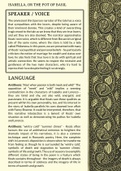ISABELLA, OR THE POT OF BASIL
SPEAKER / VOICE
The omniscient third person narrator of the tale has a voice
that sympathises with the lovers, despite being aware of
their imminent demise. This creates a kind of overarching
tragic mood to the tale as we know that they are true lovers,
and yet they are also doomed. The narrator approximates
Keats’ own voice, which is different from Bocaccio’s original
tale of the same name, where the story is told by a lady
called Philomena. In this poem, we are presented with many
of Keats’ sociopolitical and personal beliefs - he particularly
criticises the notion of marriage for wealth and status over
love; he also feels that true love is to do with spiritual and
artistic connection. He seems to respect the restraint and
gentleness of the two main characters, who try hard to
repress their love despite feeling it so strongly.
LANGUAGE
Antithesis: “Alas! when passion is both meek and wild!” The
opposition of “meek” and “wild” implies a seeming
contradiction in the characters of Isabella and Lorenzo -
they are timid and shy, yet also wild, energetic and
passionate. It is arguable that Keats saw these qualities as
present within his own personality, too, and his interest in
the story of Isabella parallels his own doomed love affair
with Fanny Brawne. It could be interpreted, therefore, that
this narrative interjection is a lament of Keats’ own
situation as well as demonstrating his pathos for Isabella
and Lorenzo.
Antithesis: “wintry cold” “summer climes” - Keats often
favours the use of antithetical extremes to heighten the
dramatic impact of his narratives, it is also a common
technique used in Romantic poetry. Here, the complete
shift in Lorenzo’s disposition is shown when he transforms
from feeling as though he is surrounded by ‘wintry cold’,
symbolic of death and stagnation to ‘summer climes’,
symbolic of life and growth. The use of seasons to exemplify
different states of being in the poem is a feature which
Keats sustains throughout - the imagery of death is always
described in terms of coldness and the imagery of life in
terms of warmth and growth.
, Foreshadowing, metaphor: “Twin roses by the zephyr blown apart” -
the adjective ‘twin’ emphasises the sense of harmony that the lovers
share, that their natures are perfectly suited to one another. Roses in
the 19th century are common motifs of love and romance, so the
description of the lovers as ‘roses’ connotes their beauty, fragility and
intense passion. The phrasal verb ‘blown apart’ implies that they are
separated - at this moment the separation is temporary, but the line
perhaps foreshadows Lorenzo’s death later on.
Aphorism: “there is richest juice in poison-flowers.” - Keats here uses an
extended metaphor of horticulture to suggest that the best nectar
comes from tainted or poisoned flowers. The symbolic effect is to
suggest that the best stories or the ideas with the strongest depth to
them always come from a place of danger, suffering or hardship. We
may relate this to the intentions of the tragic genre - tragedy being a
form of literature that always conveys valuable messages through the
trials and suffering of its central characters. This perhaps also recalls
Keats’ own belief of ‘negative capability’, that intense beauty and
positivity can come from times or states of difficulty (see context for
more info).
Rhetorical questions, repetition: “Why were they proud? Because red-
lin’d accounts / Were richer than the songs of Grecian years?” The
repetition of the rhetorical question ‘Why were they proud?’ creates
an insistent tone where Keats’ narrative voice lingers over the sinful
behaviour of the brothers, implying that pride is the root of their
villainy. In between this question, he asks other accusatory rhetorical
questions that pragmatically imply the faults of the brothers. For
instance, the idea that in the brothers’ minds ‘red-lin’d accounts / Were
richer than the songs of Grecian years’ implies that they favoured
business and money making over the beauty of myth and poetry. They
are depicted as practical, uncreative beings who are obsessed with
building wealth, yet unable to exist positively in the world due to their
lack of spirituality and appreciation for beauty - this in turn is the reason
why they cannot understand or condone the relationship between
Isabella and Lorenzo.
Synecdoche: “these money-bags” Keats refers to the brothers by their
purses, demonstrating that the only thing that defines them is their
wealth; this further emphasises their lack of goodness or creativity and
underscores their limited view over the world.
Simile: “every dealer fair / Must see behind, as doth the hunted hare.” -
all fair, honest people must keep an eye out as they are like the hunted
hare, being preyed upon by a predatory force. In this case, the line is
foreshadowing the tragic demise of Lorenzo, who is hunted down in the
forest like an innocent, unsuspecting prey.






